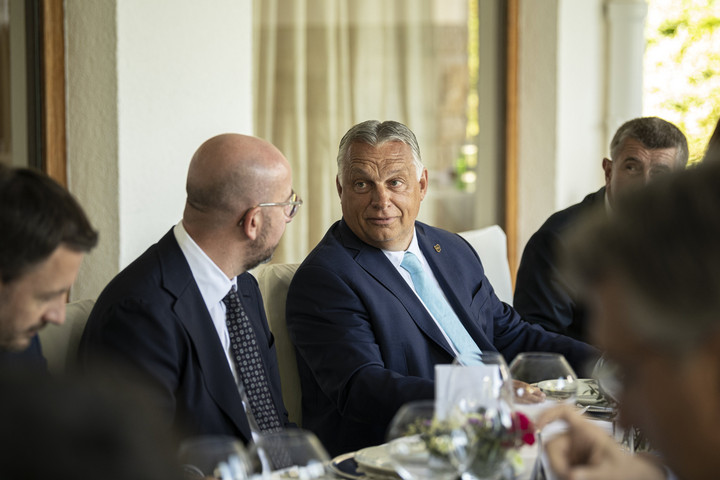
By Mariann Őry
The topic of migration dominated the debate on the future of Europe at the Strategy Forum in Bled. Prime Minister Viktor Orbán said that the powers to manage immigration should be transferred to nation states.
At the opening of the Strategy Forum in Bled on Wednesday morning, Slovenian Prime Minister Janez Janša called for a strong Europe based on strong member states. David Sassoli, President of the European Parliament (EP), delivered the keynote speech at the opening of a panel discussion on the future of Europe. The Italian socialist politician, who was the only one of the participants who did not speak English and had his words translated by an interpreter, spoke out in favour of the distribution of asylum seekers in a large part of his speech.
In response to a question about the nature of politics, Prime Minister Viktor Orbán stressed that the task of political leaders is to prepare the people and the nation for the future, and to do so they must first understand what that future will look like. After that, it must be determined which instruments are available, which are not and how the latter are to be procured. Czech Prime Minister Andrej Babiš stressed crisis management, Janša the need to coordinate different interests, and Serbian President Aleksandar Vučić advocated bold decisions.
Migration was an important issue in the debate, with leaders expressing their differences. Contrary to Sassoli’s pro-immigration remarks, Greek Prime Minister Kiriakos Mikotakis argued that one should learn from the mistakes of the 2015 migrant crisis and help asylum seekers on the ground and protect borders.
Orbán recalled that in 2015 he was the first to warn that mass migration threatens Europe’s security and cultural identity. He also pointed out that there were considerable differences of opinion on this issue and that all powers in the field of migration would have to be returned to the nation states if they did not want them to tear the Union apart. He also pointed out that Hungary does not want to address demographic problems through migration, but through a traditional, Christian family policy.
The Czech Prime Minister described the situation in Afghanistan as a disgrace and a disaster. He also recalled that he and Viktor Orbán had vetoed the “stupid idea” of quotas.
On the subject of migration, Sassoli drew an analogy to the experience of the collapse of the Roman Empire, to which Viktor Orbán later replied that Hungary’s historical experiences represent a more relevant parallel, since all migrants arriving in Europe today are Muslims. He warned that the migrants arriving now would change the composition of Europe and question our common Christian cultural heritage.
Asked about EU enlargement, the Hungarian Prime Minister stressed that Serbia’s accession to the EU was of strategic geopolitical importance. Vučić expressed his disappointment with the accession negotiations. He said that because of the delay in their EU integration, the Western Balkan countries are looking for their own solutions to protect their interests, even if not everyone is happy about it.
On the future of Europe, Orbán said his vision was to “stay together.” This presupposes economic success, without which there is no political basis for common values.
Orbán talks with Croatian Prime Minister
Prime Minister Viktor Orbán discussed the political situation in Europe, the future of the EU and Hungarian-Croatian cooperation with his Croatian counterpart Andrej Plenković on Wednesday in Bled, Slovenia, Bertalan Havasi, the Prime Minister’s press chief, told the Hungarian press agency MTI.
At the meeting, Croatian Prime Minister thanked Hungary for its help in repairing the damage caused by the earthquake in Croatia last year.
Current issues of Hungarian-Croatian regional economic cooperation and the importance of border management were also discussed.
In the context of the ongoing talks on the future of Europe, Orbán and Plenković agreed that Central Europe must represent its interests in the negotiations.
This article first appeared on MAGYAR HÍRLAP, our partner in EUROPEAN MEDIA COOPERATION.